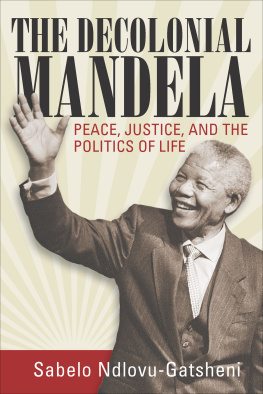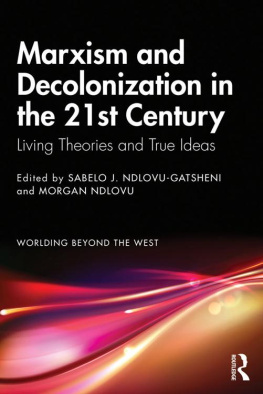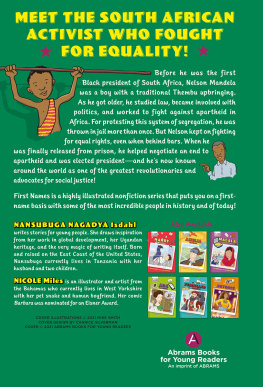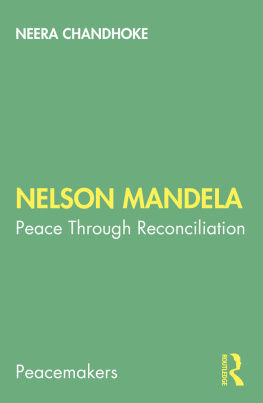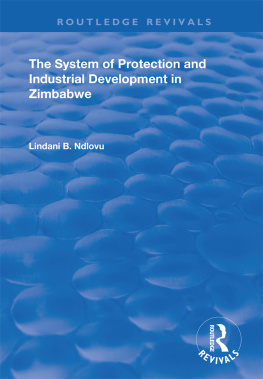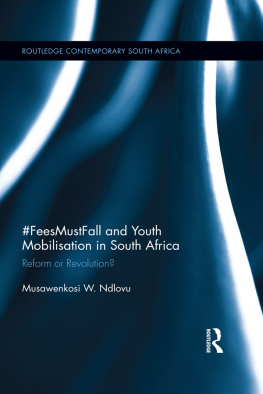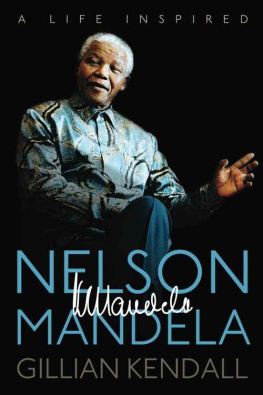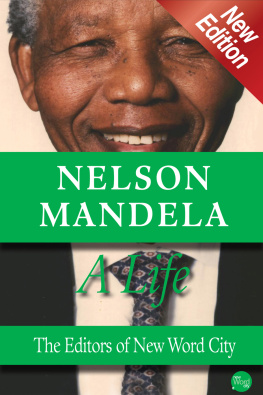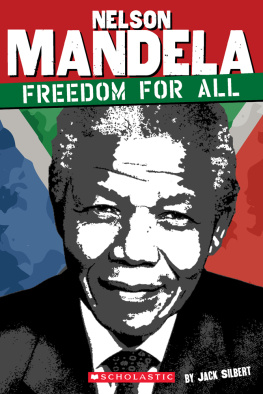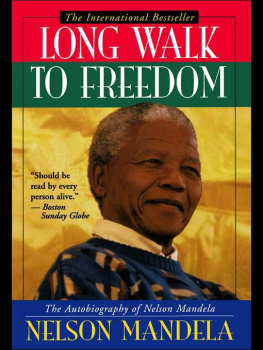The Decolonial Mandela
The Decolonial Mandela
Peace, Justice and the Politics of Life
Sabelo J. Ndlovu-Gatsheni
Published in 2016 by
Berghahn Books
www.berghahnbooks.com
2016 Ndlovu-Gatsheni
All rights reserved. Except for the quotation of short passages
for the purposes of criticism and review, no part of this book
may be reproduced in any form or by any means, electronic or
mechanical, including photocopying, recording, or any information
storage and retrieval system now known or to be invented,
without written permission of the publisher.
Library of Congress Cataloging-in-Publication Data
Ndlovu-Gatsheni, Sabelo J., author.
The decolonial Mandela: peace, justice and the politics of life / Sabelo J. Ndlovu-Gatsheni.
p. cm.
Includes bibliographical references and index.
ISBN 978-1-78533-118-3 (hardback) -- ISBN 978-1-78533-296-8 (paperback) -- ISBN 978-1-78533-119-0 (ebook)
1. Mandela, Nelson, 1918-2013--Influence. 2. Anti-apartheid movements--South Africa--History. 3. South Africa--Politics and government. 4. Postcolonialism--South Africa. 5. Humanism--South Africa. I. Title.
DT1974.N38 2016
968.065092--dc23
015036461
British Library Cataloguing in Publication Data
A catalogue record for this book is available from the British Library
ISBN 978-1-78533-118-3 hardback
ISBN 978-1-78533-296-8 paperback
ISBN 978-1-78533-119-0 ebook
To the memory of Sentime Kasay, a humble colleague and a dedicated young decolonial scholar, whose life was cut short in 2013.
To the dedicated members of the Africa Decolonial Research Network (ADERN). Ours is a civilizational decolonial humanist struggle, where there is no space for bigotry, sexism, racism, tribalism or xenophobia. Aluta Continua!
Preface
While all human species live and die, Nelson Rolihlahla Mandela will never die as a symbol of a third decolonial humanist revolution privileging the struggles of the anthropos of the planet for freedom and liberation. Like all symbols of something worthwhile, unpacking and reflecting on the meanings of Mandelas life of struggle and legacy is a complex intellectual and academic undertaking. As Cornel West (2006: 13) put it, He constitutes such a challenge to us an intellectual challenge, a political challenge, a moral challenge, and an existential challenge. This is because we are trying to understand a complex political life with a global resonance and an allegory of the very birth pangs of the post-apartheid South African nation. This requires a new language of comprehension beyond the current biographical and hagiographical interventions as well as beyond the traditional liberal, Marxist and nationalist interpretations.
Indeed Mandelas life of struggle has already attracted numerous biographies and hagiographies. These biographies include F. Meers Higher Than Hope: Rolihlahla We Love You: Nelson Mandelas Biography on his 70th Birthday (1988); J. Schadebergs Nelson Mandela and the Rise of the ANC (1990); M. Bensons Nelson Mandela: The Man and The Movement (1994); M. Merediths Nelson Mandela: A Biography (1997); A. Sampsons Mandela: The Authorized Biography (1999); T. Lodges Mandela: A Critical Life (2009); Rita Barnards The Cambridge Companion to Nelson Mandela (2014) and many others. His death on the 5 December 2013 provoked new writings and reflections. The collection of essays by Barnard (2014) is among the most recent critical academic reflections on various aspects of Mandelas life focusing on such important issues as antinomies of Mandela, emotions of Mandela, Mandelas relationship with modernity and tradition, Mandela and law, and Mandela and war, as well as Mandelas mortality. What is distinctive about Barnards book is that it is a critical reflective work of various scholars on the life on Mandela but is not focused on the broader meanings of the Mandela phenomenon. The distinguished African historian Toyin Falola edited Mandela: Tributes to a Global Icon (2014), capturing the best eulogies on Mandela and reflecting on his virtues, greatness and contributions to the struggles for peace, justice and life itself.
But some of the earlier attempts at encapsulating the meaning of Mandela frantically tried to reduce him to a fixed ideological orientation ignoring the fact that Mandela was a symbol of a third decolonial humanist age with the capacity to embrace various ideological strands as long as they advanced the liberation struggle of the anthropos of the planet. But his life of struggle and legacy had a decolonial civilizational content for both the colonizer and the colonized. In Mandela, the erstwhile white colonizer who had fallen from humanity to the extent of enslaving and colonizing other human beings, found an invitation back into humanity. The colonized people who had been written out of the human ocumene and whose ontological density had been drained and denied had to be liberated from invented and colonially imposed inferiority complex so as to regain lost ontological density.
This book is not yet another biography of Mandela. Nor is it a eulogy of Mandela. It is a critical decolonial reflective and interpretive study of the Mandela phenomenon as an idea, symbol, signifier, voice, expression, representation and resource in a political rhetoric of decolonization. The Mandela phenomenon is constitutive of a decolonial humanistic civilizational project aimed at transcending the Euro-North American-centric modernity that authorized and enabled the slave trade, imperialism, colonialism, apartheid and underdevelopment of other parts of the world. Mandela, just like other African decolonial humanists like C.L.R. James, William E.B. Dubois, Mahatma Gandhi, Frantz Fanon, Thomas Sankara, Stephen Bantu Biko and many others, sought to decolonize, deracialize and deimperialize an asymmetrically structured world system and its imperial-colonial global orders that has been in place since the time of the onset of colonial encounters. What I call the Mandela phenomenon is also a constitutive part of what Ngugi wa Thiongo (1993) described as moving the centre while remaining unrepentantly universalist. Mandela is one of those African leaders whose life of struggle and legacy contributed immensely to the process of moving the centre of EuropeNorth America-centric modernity/imperialism/colonialism/apartheid to accommodate black humanity. It entailed moving black people from the margins to the centre of the envisaged modern, genuinely decolonized and deimperialized world.
Mandelas life of struggle and legacy is an embodiment of a politics of life as defined by Enrique Dussel in his Twenty Theses on Politics (2008) and is a leitmotif of his Politics of Liberation (2011). The Mandela phenomenon is founded on decolonial politics that privileges the recognition of pluriversality as a foundation of human experience. Such a politics of life recognized the flowering of histories and cultures of different peoples of the earth as the normal state of human life that must be celebrated rather than criminalized. In this politics of life, Mandela emerges as a voice of decolonial ethical reason ranged against imperial reason. In this scheme of politics of liberation, Mandela becomes that embodiment of a paradigm of peace as opposed to the imperial paradigm of war that has been in place since the dawn of Euro-North American-centric modernity.


